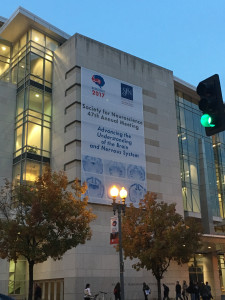During the week of November 11th- 15th, the 47th Annual Meeting of Society for Neuroscience (SfN), the largest international neuroscience conference took place. This conference rotates between a few big cities, and for 2017, it was held in Washington D.C.. To give you an idea of the size of this conference, this year there were 30,021 attendees from 80 countries. Of the attendees, there were 13,552 abstract presentations, and 534 exhibiting companies. Neuroscientists from around the world gathered in our nation’s capital to present their most current cutting-edge research in their subfields.
Attending SfN for the first time this year was a great experience, but at times overwhelming. Since starting graduate school, it has been stressed over and over that presenting research during scientific meetings is extremely important. The ability to effectively communicate your research to peers and members outside of your field is crucial. While I haven’t had extensive experience presenting my research, SfN gave me the opportunity to do so with a poster presentation. On Saturday, November 11th, I presented my work to those who were interested and fielded many questions. Being probed with questions was a great experience. It helped me realize some areas of my research I felt strong and comfortable talking about, and other areas where I could use more work. While the poster presentation was the reason I went to SfN, other aspects of the conference were even more beneficial.
Over the course of 5 days there were countless lectures and symposia given by attendees. It was exciting to see how many different labs were also modeling human diseases with stem cells, similar to my current work. At the same time it was just as interesting to see all of the different types of neuroscience research being done. While I was able to attend many talks, two still stand out, one regarding artificial intelligence, and the other regarding remembrance of events while going under and coming out of propofol anesthesia.
In addition to lectures, there were also many vendors present through the conference, advocating for new products and technologies. Talking to vendors and other presenters/attendees allowed me to form connections that may lead to future collaborations or even a job after graduate school. It is never too early to start networking and thinking about the future. After graduate school, I will be looking for a job in industry, and being able to start that initial connection with companies was a valuable experience.
While many neuroscientists from Rutgers attended the conference, I was able to ask a few about their experiences at SfN and how they tie into future career goals:
Sara McEwan [2nd year PhD candidate, lab of Dr. Bonnie Firestein]
“This was my first time at SfN, and while I was not presenting my research I still found it to be a valuable experience. During the two day period, I was able to attend the meeting, I viewed several oral and poster presentations given by leaders in my field of research and networked with various specialists relevant to my intended career path. I hope to be able to attend next years meeting, this time as a presenter!”
Sabrina Walley [3rd year PhD candidate, lab of Dr. Troy Roepke]
“Attending the SfN conference has not only given me the opportunity to present my research to my peers, but gain advice, knowledge, as well as networking opportunities for future experiments or grants. In addition, the vendors present during the SfN2017 allowed me to see, and maybe even test, the newest electronics or kits available.”
Andrew Dieterich [2nd year PhD candidate, lab of Dr. Ben Samuels]
“Attending SfN exposed me to many novel techniques and interesting findings within my field, which have given me new ideas for my research. Also, I met a number of colleagues and have begun establishing a network of connections, which will grow throughout my PhD and hopefully contribute to my career.”
Janace Gifford [3rd year PhD candidate, lab of Dr. George Wagner]
“SfN is always a great experience! It never fails to stimulate conversations that further develop my own research and help to troubleshoot issues. Most importantly, networking at SfN provides me with the opportunity to make meaningful connections to lay a groundwork for future collaborations or post-graduate school opportunities.”
Anna Giarratana [3rd year PhD candidate, MD/PhD program, lab of Dr. Janet Alder]
“Going to a conference like SFN can be really valuable, even though it may seem overwhelming at first. You may talk to hundreds of people over the 5 days you are there, but if even one or two of those conversations leads to something, it’s worth it. For example, I talked to people in both academia and industry at this year’s conference, and have already been in contact with them about future possibilities. It’s a great opportunity to expand your network and meet new people in your field.”
These five excerpts from graduate students who attended SfN gives you an idea of how beneficial attending a conference can be. We all agreed that while SfN is a massive meeting, everyone was able to find at least some portion of the conference beneficial to their current lab or future career goals. If you are on the fence about attending SfN, I would definitely recommend going. It is an incredible experience being around so many brilliant scientists in the field.
